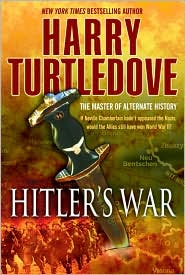
Everyone knows of my love of Harry Turtledove. He is a master of alternative history (see ... it says so on the book cover!), and he never disappoints. His newest novel presents of view of what might have happened if Neville Chamberlain hadn't backed down when Hitler was threatening invasion of Czechoslovakia and taking Sudetenland.
Our tale begins in 1936, and Nazi Germany is just starting to flex its expansionist muscles. Britain and France are sending representatives to speak with Hitler about his threatening action against their young ally in the former area of the Austro-Hungarian Empire. Discussions are not going well as Hitler has no intention of backing down. He gains a lark when news is received, during the talks, that Konrad Henlein has just been assassinated in Czechoslovakia. It is his perfect example of how Germans are being mistreated in the area. He claims there is no way that he can avoid annexation because he must protect Germans living in other countries.
From here on out, the novel presents the evolution of the war with the newest starting point. While England and France are definitely not prepared for war, Germany is not a prepared as it could be either. That does not mean that it won't have the upper hand initially. Czechoslovakia falls within a month, stranding American Peggy Druce as a non-aligned citizen in a war zone.
The story is not limited to Eastern Europe, though. The war continues to develop in Asia as Japan takes an opportunity to move against its historic enemy Russia from Manchukuo (Japanese-held Manchuria in occupied China). Spain's civil war between republicans and communists takes on greater importance as the Axis and Allies use it as a border proxy battle. The Western Front has a very different history as France seems able to better repel the invading armies of Germany. A German Jew who was a decorated veteran of the Great War is confronted with the fact that he and his family are not going to be able to fight for the Fatherland, and they are also going to be treated horribly because of their faith, though not as bad as others who are not veterans.
One of the great things about Turtledove's books is they present these alternate histories through the experiences of everyday people. Major historical figures pop up and are greatly discussed, though rarely seen, but it is these average folk that tell the story. The horrors of war and the doubt about their countries' actions and their own beliefs is true and honest and, most importantly, realistic.
The only down point about the book is that it is very clear that their will be a sequel. The novel concludes, but the war has not ended. With that said, I can't wait for the next volume to see how the war plays out!!!


